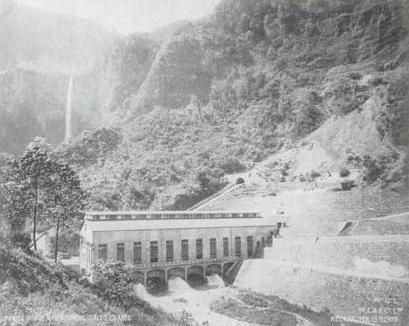Private issues 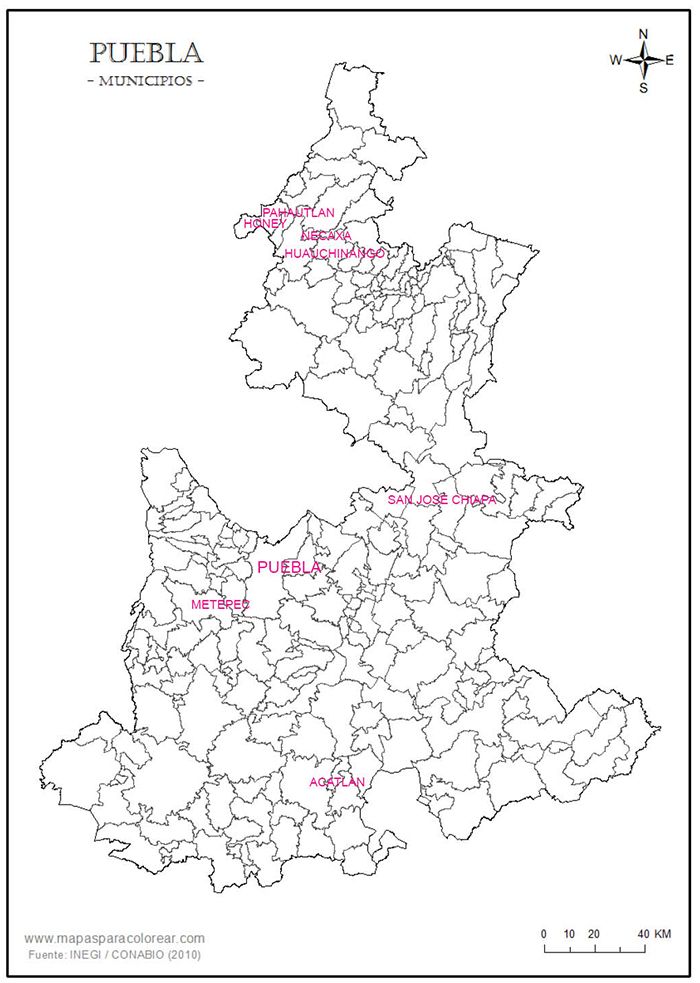
These issues were made by individuals or corporations.
Honey
Julio Hernández
Honey, named after Ricardo Honey, is a town, now in Puebla but touching the state line with Hidalgo while Pahuatlán was located fourteen kilometres away in a northeastern direction.
Julio Hernández was a major businessman in Honey and Pahuatlán. He would buy in coffee and piloncillo (a basic form of sugar), platanos and pineapples from small-scale growers in the surrounding neighbourhood and store them in his warehouses in Honey until he had acquired ten, twenty or thirty tons, when he would transport them by rail to Mexico City. Hernández’ store in Pahuatlán “was about twenty metres long, where there was buying and selling of coffee, chickpeas, all produce by quarters or quarts. There were imported clothes, there were quite a few things to buy. The people of the villages came with their loads of coffee, their loads of piloncillo, their loads of chickpea, of beans. They would sell them or buy their stuff. This was carried away on mules. You saw the streets full of mules, of all that they broughtFrancisco Prado quoted in Eugenia D’Aubeterre Buznego and Leticia Rivermar Pérez, El ciclo histórico de las migraciones en el municipio de Pahuatlán, Puebla, .
This $1 note, issued in June 1915, because of a lack of $1 notes, is payable in Pahuatlán on presentation, in multiples of five pesos.
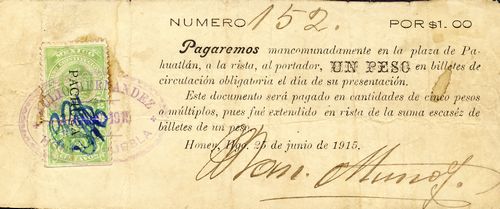 M3583 $1 Julio Hernández
M3583 $1 Julio Hernández
| from | to | total number |
total value |
||
| $1 | includes numbers 73 to 425 |
This note is signed by [ ] Muñoz[identification needed].
| [ ] Muñoz |  |
Necaxa
Cía. Mexicana de Luz y Fuerza Motriz
The plant at Necaxa in 1903
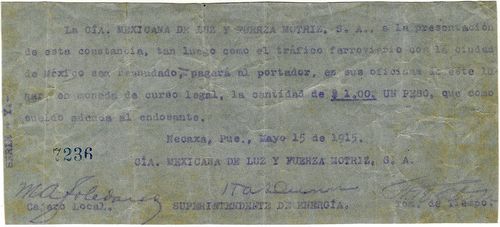 M3581 $1 Cía, Mexicana de Luz y Fuerza Motriz
M3581 $1 Cía, Mexicana de Luz y Fuerza Motriz
| from | to | total number |
total value |
||
| $1 | includes number 7236 |
The Compañía Mexicana de Luz y Fuerza Motriz (Mexican Light & Power Company Limited) was organized in 1902 with a capital of 25m dollars and in 1903 was granted a concession to exploit the falls and build a hydroelectric plant on the Río Necaxa to serve Mexico City and the mining centres of El Oro and Pachuca.
Necaxa was captured by the Márquez brothers in April 1915. Thereafter, Ruperto Vargas, in charge of the boilers there, improvised dies from iron rails and, using copper procured from the equipment at the works, made the Chiconcuatla coinage.
Because of this interruption in communications in early 1915 the company had to resort to its own paper currency. This constancia promises to pay the bearer, at its offices, in legal tender, the amount of $1 owed as wages, as soon as the railway traffic with Mexico City was reestablished. It is dated 15 May 1915 and has the signatures of M. A. [ ][identification needed] as local cashier, I. T[ ][identification needed] as superintendent and [ ][identification needed] as [ ](Tom. de Tiempo).
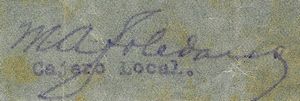 |
|
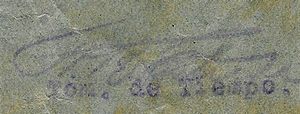 |
Huauchinango
Luis Cabrera
Huauchinango is a city in the far north of the state. The politician Luis Cabrera came from nearby Zacatlán[if correct identification] Luis Cabrera Lobato was born in Zacatlán, Puebla on 17 July 1876. He graduated from the National School of Law and worked in the law firm of Rodolfo Reyes. He was also a journalist at El Noticioso, El Diario del Hogar, La Patria and El Colmillo Blanco.
His participation in militant politics dated back to at least 1908, when he participated in the first antireelection clubs. Originally a supporter of Bernardo Reyes' candidacy, he then supported Madero's, although he was never a Maderista. He was one of the sharpest critics of the Treaties of Ciudad Juárez and of the naivety that from then on characterized most of Madero's actions. He was a deputy in the XXVI Legislature in 1912. Upon Madero’s deaths, Cabrera joined Carranza, who in 1913 appointed him confidential agent in the United States. He was Secretario de Hacienda in two periods: 1914-1917 and 1919-1920.
He accompanied Carranza to Tlaxcalantongo, but by June 1920 was in the United States, and on 26 June Obregón attacked him for political reasons, saying that "he was the author of the destruction of the credit enjoyed by our country."
In 1931 he gave a lecture at the National Library which, being considered an attack on Callismo, caused him to be banished to Guatemala by president Pascual Ortiz Rubio. In 1933 he was offered by the Anti-Reeleciotionist party the candidacy for the presidency but declined. He wrote numerous newspaper articles expressing his reasons, opposed, more often than not, to certain laws of government. In 1946 he again declined his candidacy for the presidency, on behalf of the Partido Acción Nacional. He died in Mexico City on 12 April 1954..
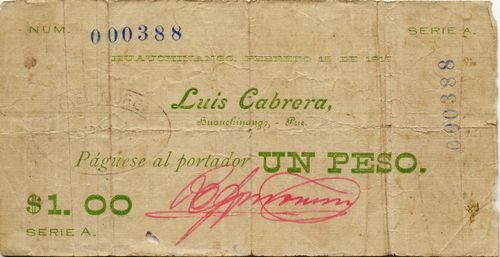 M3577 $1 Luis Cabrera
M3577 $1 Luis Cabrera
| series | from | to | total number |
total value |
||
| $1 | A | includes number 000388 |
These are signed by Rafael Moreno.
|
Rafael Moreno Rafael Moreno was Presidente Municipal of Huachinango for a brief period (18 – 29 August) in 1927 (Luis Cabrera was also Presidente Municipal for three periods in the 1920s and 1930s1 January to 15 February 1920, 1 January 1923 to 1 January 1924 and on 15 February 1934). |
 |
San José Chiapa
Hacienda Ozumba
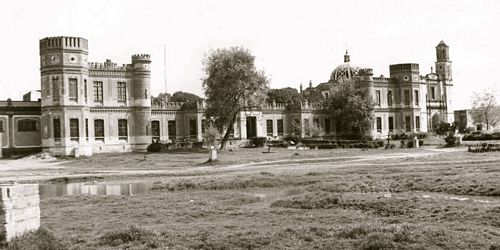
The hacienda Ozumba, which lies between San Juan de los Llanos and Chalchicomula, produced cereals, raised pigs, and had access to extensive pastures. During the years of the Revolution, the employees complained about the payment of wages with paper money (though this might not have been specific to or produced by the hacienda). During this time the management of the hacienda had reason to fear for the safety of the money sent to the farm for weekly payments.
Metepec
Tienda de Metepec
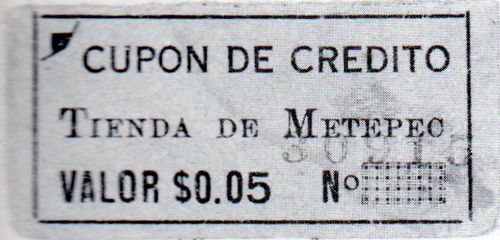 M3579 5c Tienda de Metepec
M3579 5c Tienda de Metepec
| from | to | total number |
total value |
||
| 5c | includes number 30915 |
The catalogue list a 5c cartón from this store. Metepec is part of Atlixco. Is this right, or is it the Metepec in Estado de México?
Calipam
Ingenios Calipam y Soledad
In 1908, a hacienda owned by the Faguagas was established in Calipam, with Severino Carrera Peña as its administrator. This hacienda was primarily dedicated to the cultivation of sugar cane, which was transformed into panela and brandy in a sugar mill (ingenio). In 1909 the governor of the state, Mucio Martínez, making use of his influence and the power he held, took over this hacienda.
On 20 November 1913 armed forces commanded by Melesio Cabanzo looted the Calipam hacienda.
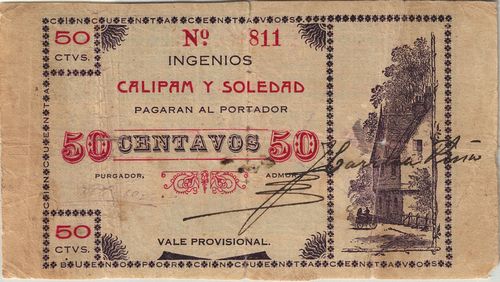 M3568 50c Ingenios Calipam y Soledad
M3568 50c Ingenios Calipam y Soledad
| from | to | total number |
total value |
||
| 50c | includes number 811 |
This note was issued by the Calipam and Soledad sugarmills. It was signed by [ ][identification needed] as Purgador (an antique title for the person in charge of removing impurities from the sugar once the production process is completed) and Severino Carrera Peña as Administrador.
| [ ][identification needed] | |
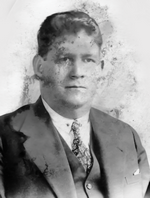 Severino Carrera Peña Severino Carrera Peña |
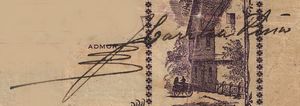 |
This note has a vignette of a very unMexican house. It is similar to a note issued by another sugarmill, the Ingenio de Ayotla, in Oaxaca, and was probably produced by the same printers (Julián S. Soto of Oaxaca?).
Acatlán
“La Favorita”
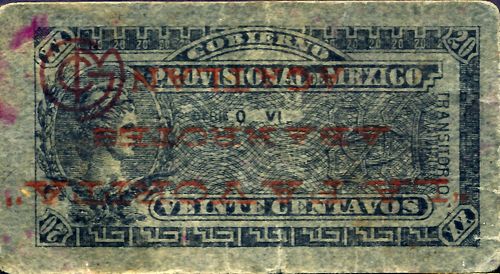
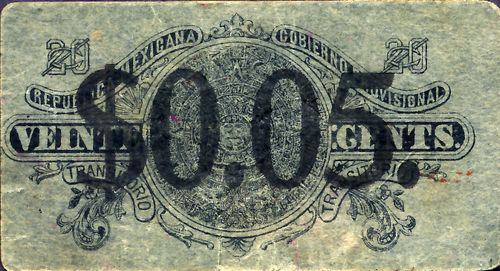 M3567 5c La Favorita
M3567 5c La Favorita
This is a 20c Gobierno Provisional de México cartón overprinted with a new denomination of 5c and, on the face, in red, the legend "LA FAVORITA" / ABARROTES / ACATLAN.
One scenario is that the grocery store itself would not have been responsible for the devaluation/revaluation, which will have been an official overprint in the short window between the beginning of June 1916 when Carranza informed the governors of various states that the Gobierno Provisional de México notes should be accepted at a rate of $4 Gobierno Provisional as one peso infalsificableCEHM, Fondo XXI-4 and the circular núm. 102 of 10 June that sets the exchange rate at ten for one. As such, the overprint will not have restricted the potential circulation and so this is not, strictly, a private issue.
Amother scenario is that, at a later date, the store found itself with a load of useless cartones and used them as a limited, private currency.
Tehuacán
Luis G. Contreras
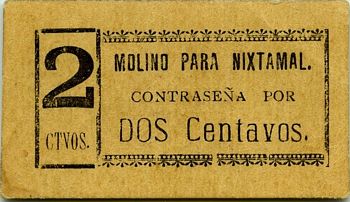
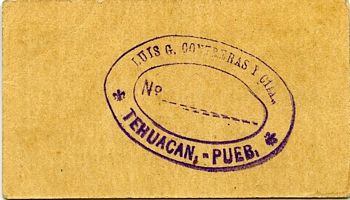 M3603 2c Molino para Nixtamal
M3603 2c Molino para Nixtamal
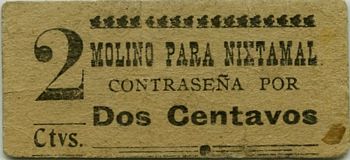
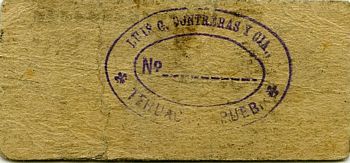 M3602 2c Molino para Nixtamal
M3602 2c Molino para Nixtamal
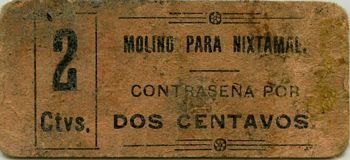
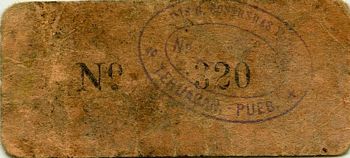 M3604 2c Molino para Nixtamal
M3604 2c Molino para Nixtamal
Luis g. Contreras y Cía., which ran a nixtamal mill, issued a variety of contraseñas for two centavos.

